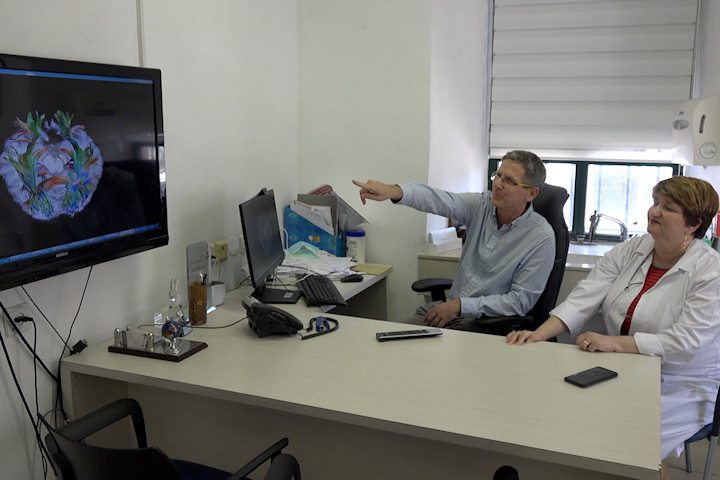Over the past few months, many people have avoided coming to the hospital due to concerns about COVID-19 – a phenomenon that has resulted in the absence of diagnosis, treatment, and monitoring of life-threatening conditions such as cerebral stroke.
 Professor David Tanne (L) with Dr. Rachel Ben Hayoun (R). Photography: Rambam HCC
Professor David Tanne (L) with Dr. Rachel Ben Hayoun (R). Photography: Rambam HCC
Rambam Health Care Campus is recognized throughout Israel for its expertise in treating stroke and prevention of adverse symptoms related to it. As result, the majority of potential stroke patients in Northern Israel are referred to Rambam. However, hospital data acquired in recent months by Rambam show that approximately 40% fewer patients with light and transient stroke-like symptoms have visited Rambam’s Green-Wagner Department of Emergency Medicine than usual, and this is due to fears of being infected with COVID-19 outweighing the desire to seek treatment. “There are significant concerns that we will soon begin to see an increase in the incidence of stroke in the community,” notes Professor David Tanne, Director of the Stroke and Cognition Institute at Rambam Health Care Campus and President of the Israel Neurological Society. "People who ignored the early warning signs sent by their bodies could find themselves in a truly dangerous situation,” he added.
A transient ischemic attack, or TIA, is a stroke that lasts for only a brief period of time, but is often a warning as to what lies ahead. In many cases, a TIA will be followed soon after by a severe stroke, which could have severe and permanent consequences. "There is a need to perform an urgent, thorough examination to determine the reasons why a patient experienced a TIA, to monitor the situation, and to prescribe preventative treatment in order to prevent the next stroke," warns Professor Tanne. "TIA patients are walking time bombs. Prompt and accurate diagnosis may save them from a life of severe disability and unnecessary death."
Professor Tanne recently lectured on the available options for preventing stroke and dementia at the prestigious 6th Annual Congress of the European Academy of Neurology, which was held virtually this year. Professor Tanne, together with other leading experts in neurology from around the world, participated in the conference, which addressed the best ways to ameliorate the enormous suffering caused by neurological diseases.
The Stroke and Cognition Institute at Rambam is a unique center with a highly skilled professional staff, providing state-of-the-art capabilities for the diagnosis, treatment, and prevention of stroke. The Institute provides consultations to patients following a stroke, as well as to patients at high risk of stroke due to cardiovascular disease or hardening of the carotid arteries that supply the brain. Decision-making in these cases is often complicated and requires multi-disciplinary consultation. The Institute coordinates the examination, decision-making, treatment, and follow-up care, and is prepared and available to serve the needs of the public through both in-person visits and remote medical consultations using video.

